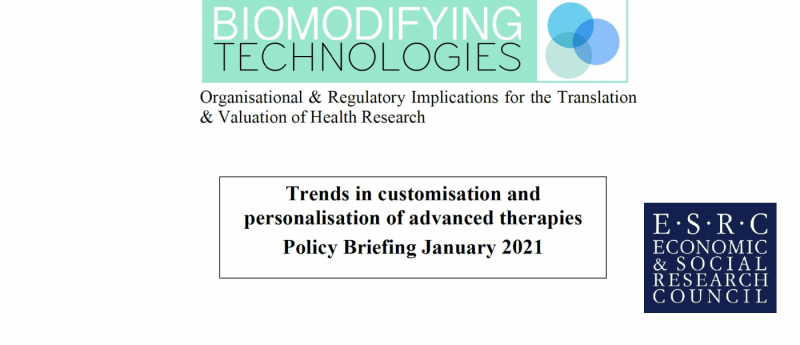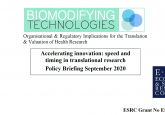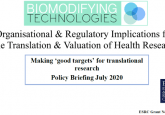Policy briefing: Trends in customization and personalization of advanced therapies

The Biomodifying technologies project was led by the University of Oxford in collaboration with colleagues at the University of Sussex and the University of York (all UK) and funded by the UK Economic and Social Research Council, and aimed to investigate the likely impact of such technology on human health, healthcare and medicine in the UK.
The Biomodifying technologies team consists of Michael Morrison, Jane Kaye (both University of Oxford, UK), Alex Faulkner, Phoebe Li (both University of Sussex, UK), Andrew Webster and Andrew Bartlett (both University of York, UK).
This is the third of four policy briefings. In this briefing, the team examines the options for customization and personalization in therapeutic applications of biomodifying technologies.
Project member Michael Morrison shares key takeaways and highlights from this briefing or jump to the full briefing below.
What are the key points in this briefing?
This briefing looks at the potential for ‘customization’ and ‘personalization’ in the clinical translation of therapies based on gene editing, induced pluripotent stem cells (iPSCs) and 3D bioprinting. Customization and personalization involve tailoring some part of a product or process to a specific situation and context, which in medicine is often done to meet the requirements of an individual patient.
While scope for personalized ‘one-off’ therapies remains limited, a variety of forms of ‘mass customization’, at the level of both therapeutic products and manufacturing processes, could complement mass-produced cell and gene therapies.
Future policy developments need to evaluate whether to support one or several forms of manufacturing within the UK healthcare sector, as each requires different forms of support, skill sets from the workforce and logistical and regulatory hurdles to viability.
What new information does this briefing provide?
The ESRC Biomodifying technologies project team utilized multiple research methods, including analysis of papers and IP filings, legal analysis of current UK and EU regulatory frameworks, interviews with stakeholders, from scientists and clinicians to representatives of SMEs and regulatory agencies, and an MHRA Patient Group Consultative Forum meeting on Biomodifying Technologies held in early 2020. Integrating these multiple sources provides up-to-date information on the current thinking and the contemporary challenges faced by different groups involved in the translational research pathway, which allows us to build on and extend previous social science work on regenerative medicine and 3D printing, including prior work by members of the project team.
Where can people find more information on the points in this briefing?
This briefing is the project’s first publicly available discussion of customization and personalization. However, manuscripts examining these issues in more details are under preparation and are anticipated to be available later in 2021.
Some of the key points are summarized in an Open Access Government short article here>>
Trends in customization and personalization of advanced therapies
BioMod-Policy-Briefing-3_Trends-in-customisation-and-personalisation





